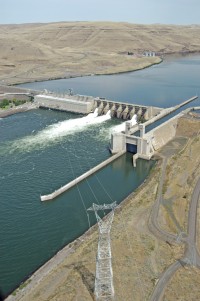Army Corps Reports Aging Hydroelectric Dam May Have Spilled 300 Gallons of Industrial Oil into Snake River
FOR IMMEDIATE RELEASE
Army Corps Reports Aging Hydroelectric Dam May Have Spilled 300 Gallons of Industrial Oil into Snake River
Latest in a long line of oil spills from Army Corps dams

August 8, 2019 (Windust, WA)—The U.S. Army Corps of Engineers (Army Corps) may have spilled up to 300 gallons of oil into the Snake River from the aging Lower Monumental Dam. According to the Army Corps, 200 to 300 gallons of turbine oil disappeared and presumably spilled into the lower Snake River. The Army Corps reported the spill to Columbia Riverkeeper, a non-profit organization, as required by to a 2014 court settlement about similar oil spills originating at Columbia and Snake river dams.
“Shockingly, the Army Corps faces no penalties for fouling the Snake River with toxic oil,” stated Miles Johnson, Senior Attorney for Columbia Riverkeeper. “Oil pollution from Lower Monumental Dam is just one more reason to remove the four obsolete, aging dams on the lower Snake River,” stated Johnson.
According to the Army Corps, the turbine that leaked oil at Lower Monumental Dam will “remain out of service until a fix has been completed.” But many in the Pacific Northwest are calling for dam removal, instead of pouring more money into the Lower Snake River dams’ deteriorating infrastructure. A recent economic analysis by the firm ECONorthwest concluded that our “society would likely be better off without the [Lower Snake River] dams.”
“These four aging dams are driving Snake River salmon and steelhead, and orcas that depend on them, toward extinction,” said Joseph Bogaard, Executive Director of the Save Our Wild Salmon Coalition. “Instead of continuing to spend hundreds of millions of dollars to keep these high-cost, low-value dams limping along, we should invest in clean energy and economic development for communities that would be affected by dam removal.”
About Columbia Riverkeeper
Columbia Riverkeeper’s mission is to protect and restore the water quality of the Columbia River and all life connected to it, from the headwaters to the Pacific Ocean. Representing over 16,000 members and supporters, Columbia Riverkeeper works to restore a Columbia River where people can safely eat the fish they catch and where children can swim without fear of toxic exposure. Columbia Riverkeeper is a member of Waterkeeper Alliance, the world’s fastest-growing environmental movement, uniting more than 300 Waterkeeper organizations worldwide. For more information, go to columbiariverkeeper.org.
About the Save Our Wild Salmon Coalition
Save Our Wild Salmon is a coalition of northwest and national conservation organizations, recreational and commercial fishing associations, clean energy and orca advocates, businesses and citizens committed to protecting and restoring abundant, self-sustaining fishable populations of salmon and steelhead to the Columbia-Snake River Basin for the benefit of people and ecosystems.
###
Background on Oil Spills from Columbia and Snake River Dams:
The Army Corps routinely spills oil from its dams into the Columbia and Snake rivers, including a series of oil spills at Lower Monumental Dam in 2017 that released over 1,600 gallons of oil into the Snake River. In 2012, the Army Corps reported discharging over 1,500 gallons of PCB-laden transformer oil at the Ice Harbor Dam on the Snake River. According to the EPA, PCBs cause cancer, as well as a variety of other adverse health effects on the immune system, reproductive system, nervous system, and endocrine system. The oil from the Ice Harbor spill contained PCBs at levels 14,000,000% greater than state and federal chronic water quality standards.
In 2014, Columbia Riverkeeper settled a lawsuit against the Army Corps to stop oil pollution from eight dams on the Columbia and Snake rivers, including Lower Monumental. The settlement required the Army Corps to apply for water pollution permits from the U.S. Environmental Protection Agency (EPA). The permits would require the Corps to monitor and reduce oil and other water pollution from the dams, but the Trump administration’s EPA refuses to issue the permits.
As part of Riverkeeper’s settlement, the Army Corps also agreed to study using non-toxic oils and implement an Oil Accountability Program to track oil spills. As a result, the Army Corps has started to use more non-toxic oils at dams along the Columbia and Snake rivers.
Additional Information:
Columbia Riverkeeper sued and forced eight large dams to reduce toxic oil pollution—a victory that the New York Times called “historic” and the Wall Street Journal called “groundbreaking.”


